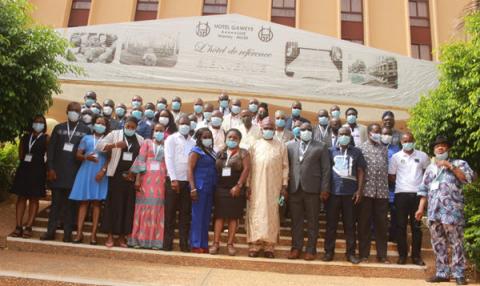
A nine-day training of trainers workshop on the management of entry points in the ECOWAS region opened in Gaweye Hotel, in Niamey, Niger, Monday 25 October 2021. Twenty-six trainees from 13 West African Member States are participating in the workshop.
The ECOWAS region continues to experience increased cross-border movements which are largely associated to free movement of persons and goods across the sub-region. While the increase in cross border movements (both legal and illegal) is known to be mainly influenced by trade and tourism, in the recent years, conflict has featured prominent as a cause. This is further exacerbated by globalization, thereby contributing significantly to the spread of infectious diseases and fueling disease outbreaks and other epidemics as was the case of the Ebola outbreak of 2014 and more recently, COVID-19 pandemic.
It is against this backdrop that the cross-border spread of COVID-19 particularly across inadequately manned borders became a major threat. The spread of COVID-19 and indeed other infectious disease outbreaks in the region have been known to spread due to several socioeconomic, political, cultural, and health factors. These include, but are not limited to weak laboratory capacities for diagnosis, inadequate public health experts and medical personnel to provide prevention, control and treatment services; lack of collaboration across borders thereby leading to inconsistent management of cases and overall compliance to public health measures, harmonized policies, protocols and guidelines across borders, inadequate data (poor data management) and inadequate (or lack of) health facilities as well as minimal coordination of multisector actors at points of entry.
When outbreaks occur in areas with highly mobile populations and weak borders, there is higher risk of further spread of the outbreak to connect other locations. The complex movement patterns in border communities and among mobile populations present challenges in identifying and tracking infected or exposed travelers, and facilitating appropriate public health management strategies. Strong and effective cross-border collaboration and capacity-building at points of entry (PoE) are required to strengthen the regional health security. Additionally, the International Health Regulations (IHR) Joint External Evaluation (JEE) revealed multiple gaps in PoE core capacities in ECOWAS countries that need to be addressed for the improvement of regional health security.
Hence, in order to strengthen regional health security against public health events, West African Health Organization (WAHO) through the Regional Center for Surveillance and Disease Control (RCSDC) in collaboration with USAID West Africa, US CDC, and AFENET is supporting this regional initiative to strengthen capacities at PoE in West Africa. It is also anticipated that this regional initiative in addition to strengthening cross-border framework to facilitate the free movement of people, goods, and services within the region, will go a long way toward mitigating these challenges.
WAHO together with partners had earlier conducted a PoE curriculum harmonization and validation exercise. Following the successful validation of the PoE curriculum, a nine-day training of trainers workshop is being organized to start the cascade regional and national training of PoE officers on the harmonized and validated regional PoE curriculum. The workshop is currently holding at Gaweye Hotel, in Niamey, Niger from Monday 25 October to Tuesday 2 November 2021 with over 26 participants from 13 member states. The curriculum and training materials were provided in the three official regional languages. The workshop was opened by the Minister of Health, represented by the Permanent Secretary Ministry of Health, Niger, who welcomed the participants and partners present and thanked WAHO for choosing Niger to host this important meeting and reiterated Niger's commitment to support this training. The opening was preceded by the speeches by the representatives of IOM, AFENET and WAHO. WAHO DG represented by Dr Joshua Obasanya congratulated the Niger authorities for their proactive leadership and commitment to the success of the meeting. The participants from this workshop are expected to form the core team of trainers that will cascade the country level training
